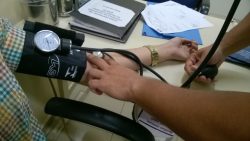What Does a Day in Detox Look Like?
You know the basics. You know detox is the process by which you transition from acutely intoxicated to a state free from the physical effects of drugs and alcohol. You probably even know a few different methods of detox. There is a medical model with doctors, nurses, and medication in the context of a hospital setting; there is the social model where support staff helps you in a non-hospital setting; and, there are rapid programs touted for their perceived (but extremely dangerous) ability to eliminate physical symptoms of addiction in hours rather than days or weeks. But, the details of what a day in detox is like might still be confusing. The reality is that although there are some common detox patterns—easing of withdrawal, urging to seek treatment, etc.—the hour-by-hour goings on are different in every model of detox and for every provider.
If you want an itinerary, you will need to contact your detox provider. However, what follows will be a general overview of the common practices.
For help finding a detox center that will work for you, our experts can answer questions, connect you with resources, and suggest programs.
Care Matching

You will undergo a medical evaluation prior to being placed in a detox program.
Before you go through actual detox, you will go through some assessment and the goal is to determine the appropriate care type. Providers are trying to develop an effective system of care that matches your clinical needs with a fitting care setting in the least constricting and most economical method possible.
There are five adult detoxification levels identified by the Substance Abuse and Mental Health Services Administration. (SAMHSA):
- Ambulatory detoxification without extended onsite monitoring
- Ambulatory detoxification with extended onsite monitoring
- Clinically managed residential detoxification
- Medically monitored inpatient detoxification
- Medically managed intensive inpatient detoxification
The substance to which you are addicted will also affect the care you are placed in. For example, alcohol, sedative-hypnotic, and opioid withdrawal will generally require hospitalization or some other type of 24-hour medical care.
Placement Criteria
The treatment setting and intensity of care is extremely vital. Because of this, the American Society of Addiction Medicine created a patient placement criteria. Six aspects of your condition will be assessed.
- Severe intoxication and/or withdrawal possibility
- Biomedical conditions and difficulties
- Emotional, behavioral, or cognitive circumstances and difficulties
- Willingness to change
- Relapse, continual use, or sustained problem potential
- Recovery/living atmosphere
Before the actual detox process begins, be prepared for these criteria to be assessed, along with many others. You will also undergo a full medical examination. These will be a part of every detox experience and are definitely part of what day one in detoxification will look like.
Your Care and Comfort
Detox won’t all be lying on a cot and cycling though withdrawal symptoms, even if your facility makes you go cold turkey. There will be other supports offered:
The staff will assist you in any way to get you cleaned up after you enter detox. You will also be bathed when you are medically stabilized. If you show evidence of skin conditions, like lice or scabies, you will be treated.
In terms of your physical health, you will be screened for tuberculosis and physical trauma, including lacerations and bruises. You should also have dental and oral care accessible. Tetanus immunizations may also be something you need.
On a larger physical health scale, some of your early day-to-day detox experience will include an emergency visit if you show signs of altered mental state or level of consciousness. Based on the results, you may be hospitalized. If you have evidence of a head injury, you will be monitored.
If you have been ignoring your nutritional needs, you may be given large meals during your detox. This is particularly relevant to stimulant abusers.
Your addiction may have left you disgruntled and day-to-day detox may be designed to avoid confrontation with you. You may be left alone for a lot of it.
Again, the actual details will vary based on the substance you have been using, the care setting determined, your assessment results, and the facility offering the detox.
The best thing you can do to get an idea of what detox is like is to research programs and speak with a professional. Give us a call at 800-996-6135 .

